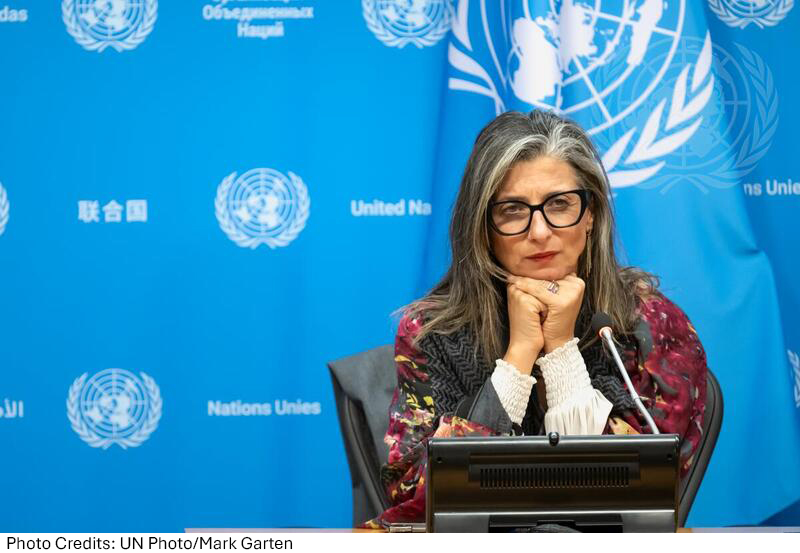The International Commission of Jurists (ICJ) condemns the US administration’s decision to sanction the UN Special Rapporteur on the situation of human rights in the Palestinian territories occupied since 1967, Francesca Albanese, solely for her fulfillment of her functions as an independent expert appointed by the UN Human Rights Council, in contravention of the 1946 Convention on the Privileges and Immunities of the United Nations.
On 9 July 2025, US Secretary of State Marco Rubio announced sanctions against Albanese pursuant to a February 2025 Presidential Executive Order, which grants the US authorities powers to sanction individuals who directly engage in any effort by the International Criminal Court (the ICC) to investigate, arrest, detain, or prosecute those accused of crimes under its Statute without their country of nationality’s consent.
On the same day, Albanese had criticized Italy, France and Greece, as States Parties to the ICC, for flouting their legal obligations to arrest and surrender Israeli President Benjamin Netanyahu by granting him permission to use their airspace as he travelled to the US. Mr Netanyahu is currently wanted under an ICC arrest warrant for alleged war crimes and crimes against humanity committed in Gaza.
“As the International Court of Justice has made crystal clear, UN Special Rapporteurs enjoy immunity when acting in the exercise of their functions and, as such, are protected from any legal process of any kind,” said Saïd Benarbia, ICJ Middle East and North Africa Programme Director.
“Instead of sanctioning and intimidating Albanese, the US authorities must ensure that the perpetrators of egregious crimes under international law committed in Gaza are not shielded from accountability.”
The sanctions against Albanese are the latest effort by the US and Israel to stymie independent investigations into, and scrutiny of, Israel’s conduct in Gaza.
In February 2025, the US administration imposed travel and economic sanctions on the ICC Prosecutor, Karim Khan, and then followed with further sanctions, in June 2025, against four ICC judges: Judge Reine Adelaide Sophie Alapini Gansou; Judge Solomy Balungi Bossa; Judge Luz del Carmen Ibáñez Carranza; and Judge Beti Hohler.
“If the sanctions against Albanese remain in place unchallenged, their chilling effect will present an existential threat to the mandate of all UN Special Procedures and the entire UN human rights machinery,” added Benarbia.
“The international legal order demands that ICC judges, prosecutors and UN Special Procedures be allowed to fulfil their functions independently without fear of reprisal.”
The ICJ urges the US authorities to immediately rescind the sanctions against Albanese and to comply with their obligations under international law, in particular those on immunity of UN officials, and on preventing and suppressing war crimes, crimes against humanity and genocide.
Background
In its 1999 advisory opinion, the International Court of Justice held that UN Special Rapporteurs are to be considered “experts on missions for the United Nations”, within the definition provided by section 22 of the 1946 Convention on the Privileges and Immunities (the Convention). As such, they are entitled to the Convention’s privileges and immunities, including those under section 22(b), namely, immunity from “legal process of every kind” for statements and actions carried out in the exercise of their functions.
With respect to the arrest warrant issued against Mr Netanyahu, in November 2024, the Pre-Trial Chamber I of the ICC found reasonable grounds to believe that Mr Netanyahu bears criminal responsibility for the war crime of starvation as a method of warfare, and the crimes against humanity of murder, persecution and other inhumane acts. The Chamber also found reasonable grounds to believe that Mr Netanyahu bears criminal responsibility as a civilian superior for the war crime of intentionally directing an attack against the civilian population. Consequently, the ICC issued an arrest warrant against Mr Netanyahu.
The US opposes the ICC investigation and the prosecution of Israeli and US citizens as a purported violation of their “sovereignty” since neither country has accepted the Court’s jurisdiction. The ICC has consistently held that the acceptance of the Court’s jurisdiction is not required, as the Court can exercise its jurisdiction on the basis of territorial jurisdiction. In the case at hand, Palestine has acceded to the ICC Statute and accepted the Court’s jurisdiction since 2 January 2015. As such, the ICC can investigate and prosecute all crimes proscribed under the ICC Statute that are committed by a national of any State on the territory of Palestine.
Contact
Saïd Benarbia, Director, ICJ Middle East and North Africa Programme; t: +41 22 979 3800, e: said.benarbia@icj.org
Nour Al Hajj, Communications & Advocacy Officer, ICJ Middle East and North Africa Programme; e: nour.alhajj@icj.org





